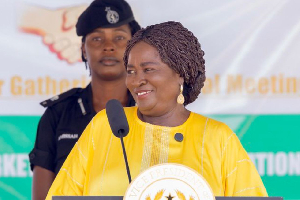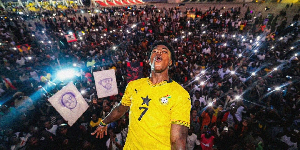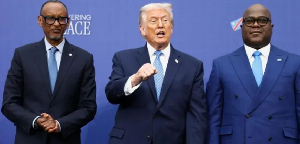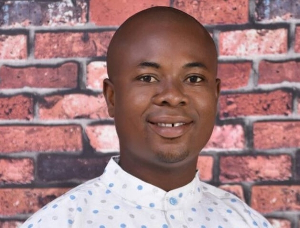Flip through the pages of a newspaper in a hotel lobby in the Ghanaian capital of Accra and you are transported on a mental flight straight back to Nairobi.
Ghana and Kenya regularly sit alongside each other in international reportage of Africa as two powerhouses on the eastern and western corners of the continent with some of the most advanced institutions and among the largest middle classes.
But, on a weeklong trip to the Ghanaian capital, it was remarkable just how striking the similarities between the two countries are.
The big debate in the second week of April was an examination cheating scandal that had been deepened by the exam council chief’s declaration that the students who had accessed papers before the official date had simply gained “foreknowledge” of the questions but had not cheated.
That stirred a storm with critics calling for heads to roll at the exam council.
In politics, economics, and even on the entertainment stage, one would imagine that Ghana and Kenya are twins separated at birth and dispatched to opposite sides of Africa.
Take the politics. The President, John Mahama, is 57 and likes to play up his youth during his campaigns, appearing in photos with comedians, sports stars and the like.
Five minutes after arriving at the Kotoka International Airport in Accra, one is greeted by the sight of a huge billboard featuring Mr Mahama and President Uhuru Kenyatta, the chief guest during Ghana’s Independence Day celebrations in March this year.
The words below the images of the two leaders on the billboard: “Investing in the Youth for African Transformation.”
Just as in Kenya, elections loom on the horizon with the Ghanaian one expected in November and Kenya set to hold its own next August.
Mr Mahama scores points for his popular touch and his communication skills. But what is the one issue which critics charge he has failed to handle appropriately?
Corruption, Corruption, Corruption. It is a constant charge levelled at him by most commentators and people on the streets.
“There is practically a scandal every week,” the prominent journalist Emmanuel Dogbevi, of the website ghanabusinessnews.com told me. “In fact, we are just waiting for the one which will emerge this week.”
To counteract that, Mr Mahama, whose campaign is far better financed than the opposition’s, has been going around the country in what critics call early campaigns but the President’s supporters say is an initiative to “launch projects”.
SELF-RULE
The opposition leaders seem like birds of a feather, too. Nana Akufo-Addo, the New Patriotic Party’s candidate, like his counterpart Raila Odinga in Kenya, comes from a distinguished political family as the son of a former Chief Justice and President of the Republic.
Mr Odinga is, of course, the son of Kenya’s first vice-president.
The Ghanaian opposition leader and his Kenyan counterpart, both in their early 70s, have faced calls to retire after their past failed attempts to capture the presidency but both have managed to remain at the helm of their parties.
Mr Odinga and Mr Akufo-Addo have positioned themselves as having the capacity to end corruption and be an improvement on the leadership styles of the incumbents but one issue above all has been driving their agitation in recent weeks: Demands for electoral reforms.
“Opposition to storm electoral commission to demand new vote register.” No, that’s not a headline in a Kenyan newspaper but from a Ghanaian outlet discussing the NPP’s claims that the vote register is skewed in favour of the ruling party. Opposition supporters have also scrawled graffiti in Accra stating: “No Validation, No Election.”
The party in power, in turn, just as its Kenyan counterpart, has accused the opposition of preparing to stir violence if they don’t secure power.
“NPP war drums on EC deliberate – an escape route as defeat looms,” read a headline in the Daily Telegraph, a paper whose content appears heavily tilted in favour of the incumbent.
Kenya and Ghana, alongside Algeria, came to acquire fame in the 1950s due to their role in the struggle for independence in Africa.
Ghana was the first to achieve self-rule in 1957, casting a sharp spotlight on the ongoing violent struggles in Kenya and Algeria.
The early nationalists in both ends of the continent were long-time friends.
Kwame Nkrumah, the towering figure at the head of Ghana’s independence movement, worked with Jomo Kenyatta to set up the first pan-African congress which was held in Britain in 1945.
Nkrumah wrote the foreword of his “friend and fellow freedom-fighter” Jaramogi Oginga Odinga’s book.
Both countries also restored multi-party politics in 1992 but Ghana has done better than Kenya in achieving peaceful changes of power after hotly contested elections, earning it the label of a model for democracy on the continent.
SECURITY ALERTS
Despite that, elections in both countries have been dogged by almost the exact same problems.
Just as in Kenya, Biometric Vote Register kits failed in Ghana during the last General Election in 2012.
Polls were extended to a second day starting a heated debate on the performance of the electoral commissions on both edges of Africa.
Away from politics, though, other similarities are visible. On the security front, armed guards stand sentry at the entrance of hotels and malls, in both Accra and Nairobi.
Ghana has been on the edge after attacks in several West African countries including Cote d’Ivoire and Burkina Faso, highlighting how unrest in Mali and Nigeria has spilled into a neighbourhood, which has known peace and stability for some time.
Matters were not helped by a recent claim by the Nigerian preacher and self-styled prophet TB Joshua that both Ghana and Nigeria should brace for terror attacks in the near future.
Ghanaian authorities immediately issued a statement saying they were on top of the security situation.
Ignoring the security alerts, however, the youth dance to Nigerian, Ghanaian, American and the occasional Kenyan hit record in swanky pubs, all stuff which would not seem amiss in a Nairobi outlet.
Tullow Oil is the factor that unites Kenya and Ghana on the economic front.
In 2007, five years before it made its oil discoveries in Kenya, Tullow announced it had found offshore deposits in Ghana in one of the more significant oil finds in Africa in years.
What happened next holds lessons for Kenya.
The Ghanaian authorities apparently overestimated the earnings they would draw from the oil and went on a spending spree, which has partly been blamed for the current economic crisis in the country, with the International Monetary Fund having been called in to offer a rescue package for the economy in 2014.
SIMILAR PROJECTS
The crisis led to acute pain for the man on the street and inflation still runs at a high level of 17.60 per cent compared to 5.97 per cent in Kenya in 2015.
Traders in a booming traditional clothes market not far from the bustling Oxford Street blamed it on corruption, which is likely to be the exact same answer one would get in Nairobi for why the economy is not doing better.
The view of Emmanuel Ammon was typical: “Cost, cost, cost. Everything is just increasing. The economic situation is very bad. You don’t know that? Just ask the people. The government just chops all the money and the people are left with nothing. We have gold and oil. What do they do with all the money?”
There are other similarities, too, including how Ghanaians comfortably narrate their views of ethnic stereotypes (best left untold but with ringing echoes of Kenya) and some national ones (with their long-time rivals the Nigerians often the target).
Billboards advertising skin lightening products and mega gospel crusades would also sit as easily in the capitals across East and West.
Even the major projects planned in the two countries have an echo of each other.
One of those is Hope City, a $10 billion tech city which was to be constructed in the outskirts of Accra.
The launch party of the hub that was to feature one of Africa’s tallest buildings was a lavish affair featuring the American hip hop artiste Chris Brown.
President Mahama broke the ground for the project in 2013 but, amid the tough economic times, the whole project has been rethought, with the Italian architects being asked to revise their designs to come up with something less ambitious.
The Konza tech hub in Kenya also seems to have slowed down after President Kibaki and its enthusiastic champion, former Information PS Bitange Ndemo, left office.
Ultimately, it is on the political scene where the similarities between the two countries are keenest.
PANAMA PAPERS
In the second week of April, the newspapers were still dominated by the revelation that the names of the relatives of two leading figures in recent Ghanaian history, former President John Kufuor and former United Nations chief Kofi Annan, had turned up among those who had stashed millions in the offshore haven of Panama.
The response to the scandal predictably broke along party lines with loyalists of Kufuor’s party defending his record in government and those in the rival party, which is now in government, urging him to come clean about corruption during his time in power.
By the end of the week, the matter seemed to have been forgotten – talk of short memories
Opinions of Sunday, 1 May 2016
Columnist: Mutiga, Murithi














